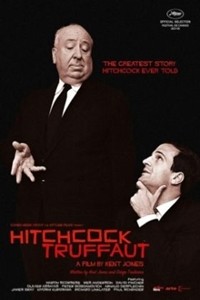 ‘Hitchcock/Truffaut’ showers us with cinematic insight
Directed by: Kent Jones
‘Hitchcock/Truffaut’ showers us with cinematic insight
Directed by: Kent Jones
Starring: Martin Scorsese, Wes Anderson, David Fincher, Richard Linklater, and more
When Alfred Hitchcock was 4 or 5-years-old, he was placed in a police station jail cell for a few minutes in order to know what prison feels like. The end results of this somewhat ghoulish “life lesson” are that Hitchcock developed a lifelong fear of the police and showcased some of his fears and obsessions in his films. For millions of movie fans, Alfred Hitchcock’s films may not be obsessions, but they are certainly revered.
In the fascinating documentary “Hitchcock/Truffaut”, it looks back at the Master of Suspense’s work through the past efforts of French film director, Francois Truffaut. Truffaut greatly respected Hitchcock, and in 1962, he traveled to Hollywood and interviewed the man for one week. With an interpreter and an audio recorder in a modest room, Hitchcock candidly spoke about his craft, philosophies and filmography with Truffaut. These series of conversations turned into a 1966 book titled, “Hitchcock/Truffaut”, and it became a "Bible" of sorts for various filmmakers.
Director Kent Jones’ movie intertwines the actual audio from those 53-year-old talks along with commentary from several prominent directors. Martin Scorsese, Wes Anderson, David Fincher, Richard Linklater, and others describe what Hitchcock meant to them and their interpretations of his material. We are treated to key scenes, and these directors explain the genius in which Hitchcock filmed specific shots and how audiences respond to them.
For instance, Scorsese walks us through a scene from “Psycho” (1960) in which Martin Balsam’s character is killed. As Det. Milton Arbogast (Balsam) slowly walks up the steps – with the camera directly facing him – in the Bates house, Scorsese says that we all know is “he’s going to get it”, but the camera’s point of view suddenly changes to an overheard shot. After a second or two, we then see – from above - “Mother” nearly sprinting with a knife towards Arbogast. Hitchcock thrived on the unexpected, and this sudden (and unexpected) change in camera angles raised the hysteria of the scene. In fact, in this documentary, Hitchcock’s own voice echoes his desire to expect the unexpected in his films.
He exclaimed, “The audience will say, ‘I know what’s coming next.’ I say, ‘Do you?’”
Of course, this film expounds on the infamous shower scene, but also on the purposely bland 35-minute opening in order to set up the audience for aforementioned shocking moment in the Bates Motel. Director Peter Bogdanovich (“The Last Picture Show”) recounts how he paid a ticket for “Psycho” in 1960 and witnessed – first-hand - how that shower scene generated long, unprecedented shrieks throughout the movie theater. Listening to Hitchcock and current filmmakers chew over movies like “The Wrong Man” (1956), “The Birds” (1963), “Vertigo” (1958), “Psycho” (1960), and more is nothing short of pure and unadulterated joy for anyone who loves movies.
The focus is mainly on the movies, however, as we do not learn much of Hitchcock’s personal life and marriage to Alma Reville. We do not learn too much about Truffaut’s life or work either, but his focus with the interviews and his subsequent book was on Hitchcock, and that is where this documentary spends its time. Narrator Mathieu Amalric (“The Diving Bell and The Butterfly”, “Quantum of Solace”) states that Truffaut’s work paints Hitchcock as “the artist who wrote with a camera”.
With a runtime of only 1 hour 19 minutes, invaluable cinematic facts, quips and insight fly by at such a rapid pace, “Hitchcock/Truffaut” is like any great piece of art, it should be looked over more than once.









